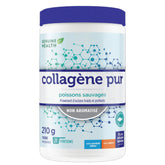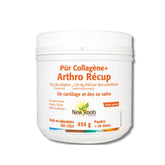What if the secret to luminous skin that ages well didn't lie in an expensive cream, but in... a protein?
20 years ago, marine collagen and algae were on the shelves of aesthetic clinics, and when a client approached us for rejuvenating treatments, the first step in her new beauty routine was to adapt her diet and integrate natural food supplements so that she would see a real change from the inside out.
Now that this practice has proved its worth, collagen has been inviting us into our smoothies, coffees, bars, etc. for several years now. gummies and all over social networks... But what is it really? Marketing myth or genuine anti-aging ally? Let's find out.
What is collagen?
Collagen is our body's "reinforced concrete". It represents around 30% of the body's total proteins, and is the key element in the structure of skin, bones, tendons, ligaments... and even gums!
In the skin, it acts as a support framework, a sort of elastic mattress that provides firmness and bounce. The problem is that its natural production declines from the age of 25, at a rate of almost 1% per year. The result? Wrinkles, sagging, loss of elasticity.
The rise of collagen in powder, gummies or liquid form
We see it everywhere: marine collagen, bovine collagen, hydrolyzed peptides... But why take it as a dietary supplement?
The idea is simple: to provide small, easily digestible pieces of collagen (peptides) capable of stimulating fibroblasts, the cells that naturally produce collagen, elastin and hyaluronic acid.
Which collagens are most effective?
- Collagen hydrolysate (hydrolyzed collagen): already predigested, better absorbed.
- Marine collagen: higher bioavailability than bovine collagen.
- With vitamin C: essential cofactor for collagen synthesis.
💡Good to know: types I and III are the most present in the skin, and therefore the most sought-after in supplements.
But which collagen source is the best and most assimilable?
Marine collagen is generally more easily assimilated
- Smaller peptide size: Marine collagen is made up of peptides with a lower molecular weight (around 3,000 to 5,000 Da), which favors faster absorption and better penetration into the bloodstream.
- Higher bioavailability: Studies have shown that the absorption rate of hydrolyzed marine collagen can reach 90-95%, compared with 80-85% for bovine collagen.
- Better for the skin: It's particularly rich in type I, the collagen most abundant in skin, bones and tendons - making it an excellent choice for beauty and anti-aging objectives.
Bovine collagen remains a good option
- It contains both type I and type III collagen (good for skin, muscles and intestines).
- It is often more affordable and used in joint, digestive and muscle support protocols, and is well tolerated, but slightly less rapidly absorbed than marine collagen.
What studies say
Collagen isn't just influencer buzz: several clinical studies have shown surprising results.
A meta-analysis from 2021 (1700 people, 26 studies) revealed:
- +12% hydration
- +9% elasticity
- Reduced wrinkles in 8 to 12 weeks
- No noticeable side effects
Source: Choi et al, International Journal of Dermatology, 2021
A 2019 study of 114 women showed, after 12 weeks of taking collagen peptides (2.5 g/day):
- More supple, smoother skin
- Significant reduction in wrinkles around the eyes
- Improved dermal density
Source: Proksch et al, Skin Pharmacology and Physiology
Another clinical trial (ELASTEN®, 2021) reports:
- Visible improvement as early as 4 weeks
- Hydration ++
- More even complexion
Collagen: 3 essential cofactors that make all the difference
There's one thing you need to know when choosing your collagen. Collagen alone, even high-quality collagen, is not enough to optimize results if certain essential cofactors are missing. These nutrients act as "activators" or "amplifiers" of collagen synthesis in the body.
1) Vitamin C - the essential cofactor for collagen synthesis
Vitamin C is essential to the body's natural production of collagen. It acts as a coenzyme that enables the bonding of the amino acids proline and lysine required for collagen structure. Without it, collagen cannot be properly produced or stabilized.
➔ Beauty effects :
- Improves skin firmness and elasticity
- Strengthens hair and nails
- Acts as an antioxidant to protect collagen fibers against premature aging
2) Silica - the architect of connective tissue
Silica (often in the form of organic silica or bamboo silica) is a key structural mineral in the formation of collagen, elastin and keratin. It helps anchor collagen fibers in the extracellular matrix.
➔ Beauty effects :
- Improves skin density and cohesion
- Strengthens hair and nails
- Promotes firmer, plumper skin
3) Hyaluronic acid - the skin's moisturizing sponge
Hyaluronic acid nourishes the collagen environment, keeping skin hydrated, supple and plump. It retains up to 1000 times its weight in water, maintaining an optimal hydration environment for skin cells.
➔ Beauty effects:
- Visible reduction in fine lines
- Improved elasticity and radiance
- Immediate plumping effect + skin comfort
How to maximize the benefits of collagen?

Of course, by adopting a healthy lifestyle, you can boost/protect your own collagen, and here are a few examples:
- Eat foods rich in vitamin C (kiwi, broccoli, parsley, baobab powder)
- Eat antioxidants (berries, green tea, turmeric)
- Avoid refined sugars: they stiffen collagen
- Protect your skin from the sun: UV rays break down the dermal matrix
- Get moving! Physical activity stimulates circulation and skin regeneration
Choosing a collagen enriched with vitamin C, silica and hyaluronic acid means moving from an isolated effect to a complete, deep and long-lasting action.
You nourish your body's structure, environment and ability to rebuild from within.
So, do we believe it or not?
Collagen isn't a magic wand. But it is an interesting support, especially if :
- If you're over 30
- You are experiencing or have experienced oxidative stress (UV, pollution...)
- You want to complete a holistic anti-aging routine from the inside out.
Collagen works, provided you :
- Regularly, it becomes a food to incorporate into your meal routine.
- If you're well-informed, choose the source and product to suit your objectives.
- Accompanied by a coherent, healthy lifestyle.
To maximize effects, choose a hydrolyzed, vitamin C-enriched product from a sustainable, transparent source.
💡Good to know: there are no noticeable side effects (provided you choose a quality product).
Finally, if you're looking to prevent the signs of aging for smoother, firmer, more radiant skin, hydrolyzed marine collagen is currently considered the most assimilable and effective source. It is ideal for anti-aging and beauty skin care. If, on the other hand, you're looking for a nutritional supplement for muscles and joints, bovine will be your ally.
To test: our selection at La Boite à Grains
For plump, luminous skin:
- Marine collagen from Natural Factors
- Liquid collagen from Revelox
- Marine collagen by Genuine Health
For less painful joints and greater comfort:
- Pur Collagène+ Arthro Récup from New Roots Herbal
- Total Body Collagen by Natural Factors
- Ancient Nutrition collagen
About the author
Ophélie Thieblemont holistic esthetician and head of cosmetics and supplements at La Boite à Grains du Plateau
In-depth knowledge of :
- Cosmetology
- Medical aesthetics
- Nutricosmetics (or cosmetofood)
- Aromatherapy
Discover all profiles of our experts!




















